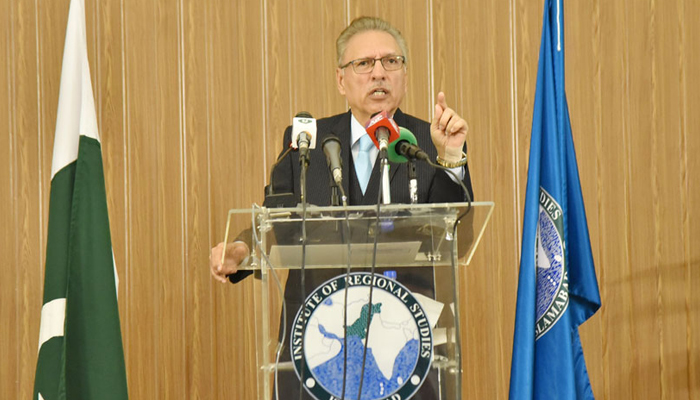Alvi for use of modern farm technology to combat climate change
ISLAMABAD: President Dr. Arif Alvi has stressed the need for Pakistan to adopt modern agricultural technology and effective decision-making to address the challenges of climate change.
In his inaugural address at the Regional Dialogue 2024 on “Climate Crisis: Shaping South Asia’s Resilience,” organised by the Institute of Regional Studies, Tuesday, President Alvi highlighted the country’s abundance of natural resources, including water and renewable energy potential.
He said that Pakistan, with approximately 150 million acre-feet of water, could meet its needs through the adoption of modern agricultural techniques such as spray and drip irrigation, moving away from flood irrigation.
He stressed the importance of implementing the national water policy and relevant legislation, suggesting that a pricing mechanism could lead to water conservation. He expressed concern over the criminal waste of around 400 million gallons per day of water in Karachi, drained into the sea through sewerage.
President Alvi also addressed environmental issues in the fishing industry, pointing out the use of prohibited nets by fishermen, resulting in a loss of marine life, and restrictions on fish imports from Pakistan by Europe. He cited examples of the Netherlands and Vietnam, showcasing their success in agriculture and fisheries despite limited resources compared to Pakistan.
The president urged the adoption of modern agriculture technology to make Pakistan a major global food supplier. He commended Pakistan’s successful approach to fighting COVID-19 through data-based strategies and national unity, suggesting that the world could follow the country’s example.
President Alvi praised the role of think tanks in conducting research and urged them to effectively market their findings to benefit policymakers. He highlighted the unprecedented progress in technology while expressing concern about the decline in human intellectual power. He observed that vested interests were influencing global affairs, undermining humanitarian values.
Ambassador Nadeem Riaz, the President of the Institute of Regional Studies (IRS), in his introductory remarks, described the Regional Dialogue as the institute’s annual flagship event.
He emphasised the IRS’s focus on regional countries, cyber security, and challenges facing South Asia.
He highlighted the vulnerability of South Asia to climate change threats affecting ecosystems, food security, and energy. Established in 1982, the IRS collaborates nationally and internationally, providing insights to policymakers and strategists through research work.
-
 King Charles' Andrew Decision Labelled 'long Overdue'
King Charles' Andrew Decision Labelled 'long Overdue' -
 Timothee Chalamet 'forever Indebted' To Fan Over Kind Gesture
Timothee Chalamet 'forever Indebted' To Fan Over Kind Gesture -
 Columbia University Sacks Staff Over Epstein Partner's ‘backdoor’ Admission
Columbia University Sacks Staff Over Epstein Partner's ‘backdoor’ Admission -
 Ozzy Osbourne's Family Struggles Behind Closed Doors
Ozzy Osbourne's Family Struggles Behind Closed Doors -
 Dua Lipa Claims Long-distance Relationship 'never Stops Being Hard'
Dua Lipa Claims Long-distance Relationship 'never Stops Being Hard' -
 BTS Moments Of Taylor Swift's 'Opalite' Music Video Unvieled: See Photos
BTS Moments Of Taylor Swift's 'Opalite' Music Video Unvieled: See Photos -
 Robin Windsor's Death: Kate Beckinsale Says It Was Preventable Tragedy
Robin Windsor's Death: Kate Beckinsale Says It Was Preventable Tragedy -
 Rachel Zoe Shares Update On Her Divorce From Rodger Berman
Rachel Zoe Shares Update On Her Divorce From Rodger Berman -
 Kim Kardashian Officially Takes Major Step In Romance With New Boyfriend Lewis Hamilton
Kim Kardashian Officially Takes Major Step In Romance With New Boyfriend Lewis Hamilton -
 YouTube Tests Limiting ‘All’ Notifications For Inactive Channel Subscribers
YouTube Tests Limiting ‘All’ Notifications For Inactive Channel Subscribers -
 'Isolated And Humiliated' Andrew Sparks New Fears At Palace
'Isolated And Humiliated' Andrew Sparks New Fears At Palace -
 Google Tests Refreshed Live Updates UI Ahead Of Android 17
Google Tests Refreshed Live Updates UI Ahead Of Android 17 -
 Ohio Daycare Worker 'stole $150k In Payroll Scam', Nearly Bankrupting Nursery
Ohio Daycare Worker 'stole $150k In Payroll Scam', Nearly Bankrupting Nursery -
 Michelle Yeoh Gets Honest About 'struggle' Of Asian Representation In Hollywood
Michelle Yeoh Gets Honest About 'struggle' Of Asian Representation In Hollywood -
 Slovak Fugitive Caught At Milano-Cortina Olympics To Watch Hockey
Slovak Fugitive Caught At Milano-Cortina Olympics To Watch Hockey -
 King Charles Receives Exciting News About Reunion With Archie, Lilibet
King Charles Receives Exciting News About Reunion With Archie, Lilibet




